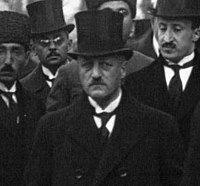Rıza Only
Rıza Nur (born August 30, 1879 in Sinop , † September 8, 1942 in Istanbul ) was a Turkish politician, writer and doctor.
In 1901 Nur graduated from the Istanbul Military Academy Medical School. With the overthrow of Sultan Abdülhamid II in 1908 he went into politics, but then came into conflict with the ruling Committee for Unity and Progress and became a member of the Freedom and Unity Party . He organized resistance against the Young Turks in Albania in 1910 and then fled into exile in 1913. Until the end of the First World War he resided in France , Egypt and Switzerland . After the First World War and the flight of the leaders of the Young Turks, he joined Mustafa Kemal Ataturk's national resistance movement and in 1919 became a member of the anti-parliament in Ankara . In 1920 he was appointed Minister of Education and Schools.
Rıza Nur was a key negotiator in the peace agreement ( Treaty of Moscow ) between Turkey and the Soviet Union in the Turkish War of Liberation in 1920 . In 1923 he founded a library in his hometown of Sinop, which today is one of the largest libraries in Turkey and bears his name. He was a member of the delegation on the Turkish side in the negotiations on the Treaty of Lausanne .
Rıza Nur was critical of Mustafa Kemal's policies. He spoke out in favor of the reinstallation of the caliphate , the instrumentalization of religious orders instead of the ban, the return of the position of women to the domestic level and an Islamic- Pan-Turkish association. Although not an official member, he was a supporter of the Terakkiperver Cumhuriyet Fırkası . When plans for an assassination attempt on Ataturk arose in Izmir and the leaders of this opposition party were brought to trial, he fled into exile in France for fear of reprisals and from there to Egypt, where he published the magazine Türk Bilik Revüsü (Turkological Review). When Ataturk died in 1938, Nur returned to Turkey. Nur stayed in Istanbul until his death in 1942.
His memoirs Hayat ve Hatıratım (“My life and my memories”) , written in four volumes in French exile, count as the most controversial work . The first part deals with his youth, the latter sections describe from his point of view the conditions and relationships of the government at that time. The work is largely regarded by historians as a political reckoning and diatribe. Inönü's role in the Lausanne negotiations is reviled and his own role is highlighted. The conversations he reproduced in the memoirs cannot be found when compared with the minutes that have been published and signed by him and are considered to have been fabricated. The reason given is his falling out with the leaders of the Republican People's Party , the offense caused by his flight and his addiction to morphine. It has recently become very popular among monarchist and Islamist history revisionists .
Works
- Servet-i Şahane ve Hakk-i Millet (Great Wealth and the Right of the People), 1909
- Yeni Usulü Hitan (Sünnet) ve Yeni Kıskaç, 1909
- Meclis-i Mebusan'dan Fırkalar (Parties in the [Ottoman] Parliament), 1910
- Fenni Cerrahi Ortopedi, 1910
- Tıbbiye Hayatından, 1911
- Cemiyet-i Hafiye (The Secret Organization), 1914
- Gurbet Dağarcığı, 1919
- Türkiye'nin Tarık-ı Selameti
- Hürriyet ve İtilaf Nasıl Doğdu Nasıl Öldü? (How were Liberty and Alliance born and how did they die?), 1919
- Türk Tarihi (Turkish History), In 14 volumes from 1924–1926
- Moskova - Sakarya Hatıraları
- Lozan Hatıraları (Memories of Lausanne)
- Oğuzname Destan Denemesi, 1928
- Namık Kemal , 1936
- Hücumlara Cevaplar (Answers to the Attacks), 1941
- Türk Birlik (magazine)
- Tanrıdağı (magazine)
- Hayat ve Hatıratım (My life and memories). İşaret, Istanbul 2004.
Web links
- Biography with picture and short bibliography in the Find a Grave database . Retrieved September 4, 2017.
Individual evidence
- ↑ Murat Bardakçı : Rıza Nur Balonu , Habertürk, July 26, 2013; Accessed March 1, 2014
| personal data | |
|---|---|
| SURNAME | Only, Rıza |
| BRIEF DESCRIPTION | Turkish politician, writer and medic |
| DATE OF BIRTH | August 30, 1879 |
| PLACE OF BIRTH | Sinop |
| DATE OF DEATH | September 8, 1942 |
| Place of death | Istanbul |
